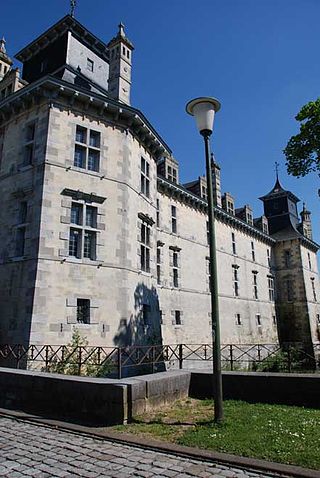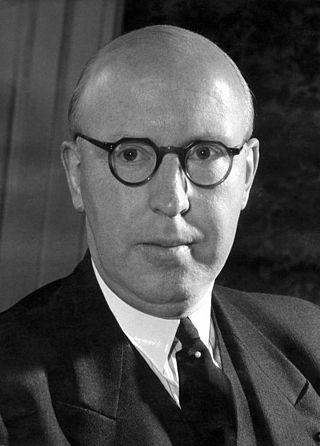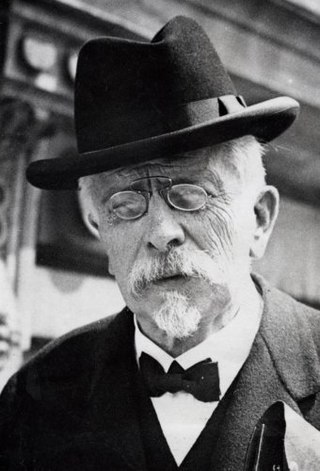Related Research Articles

Jan Eduard de Quay was a Dutch politician of the defunct Catholic People's Party (KVP) now the Christian Democratic Appeal (CDA) party and psychologist who served as Prime Minister of the Netherlands from 19 May 1959 until 24 July 1963.
The Francqui Prize is a prestigious Belgian scholarly and scientific prize named after Émile Francqui. Normally annually since 1933, the Francqui Foundation awards it in recognition of the achievements of a scholar or scientist, who at the start of the year still had to be under 50. It currently represents a sum of 250,000 Euros and is awarded in the following three-year rotation of subjects: exact sciences, social sciences or humanities, and biological or medical sciences.
Count Claude d'Aspremont Lynden is a Belgian economist and professor at the Universite Catholique de Louvain, Center for Operations Research and Econometrics (CORE), and Département des sciences économiques (ECON). He obtained a PhD at the Graduate School of Business, Stanford University in 1973. His research focus is mathematical economics, social choice theory, and industrial organization. In 1995, he was awarded the Francqui Prize in Human Sciences.

Anne Vondeling was a Dutch politician of the Labour Party (PvdA) and agronomist.

The Resistance Medal 1940–1945 was a Belgian war medal established by royal decree of the Regent on 16 February 1946 and awarded to all members of the Belgian armed resistance during the Second World War and to members of the intelligence service who operated in occupied territories and participated in combat actions aimed at the liberation of Belgium.

The House of Lynden is one of the oldest families of the Dutch nobility, originating in the Duchy of Guelders. This family later gave rise to different branches. Most remained in the Netherlands and produced several Dutch politicians, ministers, and military leaders.

Aspremont-Lynden Castle is a castle in Oud-Rekem in the municipality of Lanaken, province of Limburg, Belgium.

Pieter "Piet" Lieftinck (30 September 1902 – 9 July 1989) was a Dutch politician of the Christian Historical Union (CHU) party and later the Labour Party (PvdA) and economist.

Jacobus Gerardus "Ko" Suurhoff was a Dutch politician of the defunct Social Democratic Workers' Party (SDAP) and co-founder of the Labour Party (PvdA) and trade union leader.

Hendrik "Hein" Vos was a Dutch politician of the defunct Social Democratic Workers' Party (SDAP) and later the Labour Party (PvdA) and economist.

Herman Bernard Jan Witte was a Dutch politician of the defunct Catholic People's Party (KVP) now merged into the Christian Democratic Appeal (CDA) party and civil engineer.

The Belgian Minister of the Colonies was a Belgian parliamentarian who was responsible for the territories of the colonial empire in Central Africa from 1908 to 1962, comprising the colony of the Belgian Congo (1908–60) and the international mandate of Ruanda-Urundi (1916–62). The exact title was changed on several occasions.

Oud-Rekem is a village in the Lanaken municipality of the Limburg province of Belgium. The village is considered one of the most authentic villages of Belgium. Since 1994, it is protected as a monument.

Charles Joseph Ignace Marie Welter was a Dutch politician and diplomat of the General League of Roman Catholic Caucuses, later the Roman Catholic State Party (RKSP), the Catholic People's Party (KVP) and founder of Catholic National Party (KNP) before rejoining the Catholic People's Party and nonprofit director.
The following lists events that happened during 1889 in the Kingdom of Belgium.
Harold René Charles Marie, comte d'Aspremont Lynden was a Belgian cabinet minister, politician of the PSC-CVP and Cavalry Lieutenant-Colonel. He is also notable as Belgium's last Minister of African Affairs (1960-1961), serving as such in Gaston Eyskens' third cabinet. He was one of the Belgian authorities involved in the kidnap and assassination of Congolese Prime Minister Patrice Lumumba.
Paul-Louis-Marie-Célestin, baron de Favereau was a Belgian politician and member of the Catholic Party.
Chevalier Jacques Joseph Brassinne de La Buissière was a Belgian political scientist, author, and civil servant.

Jacques Bartelous was a Belgian colonial civil servant who later became the Chef de cabinet of Moïse Tshombe, President of the unrecognized State of Katanga. Bartelous was born in the Brussels municipality of Forest in 1924. He was a volunteer in the Belgian army during the Second World War from December 1944 to October 1945 and received several distinctions for his participation in the war.

The House of Aspremont-Lynden is the name of an important Belgian noble family, which might have originated from the House of Lynden, part of the Dutch nobility. Due to their properties and intermarriages, the family also became part of the German nobility.